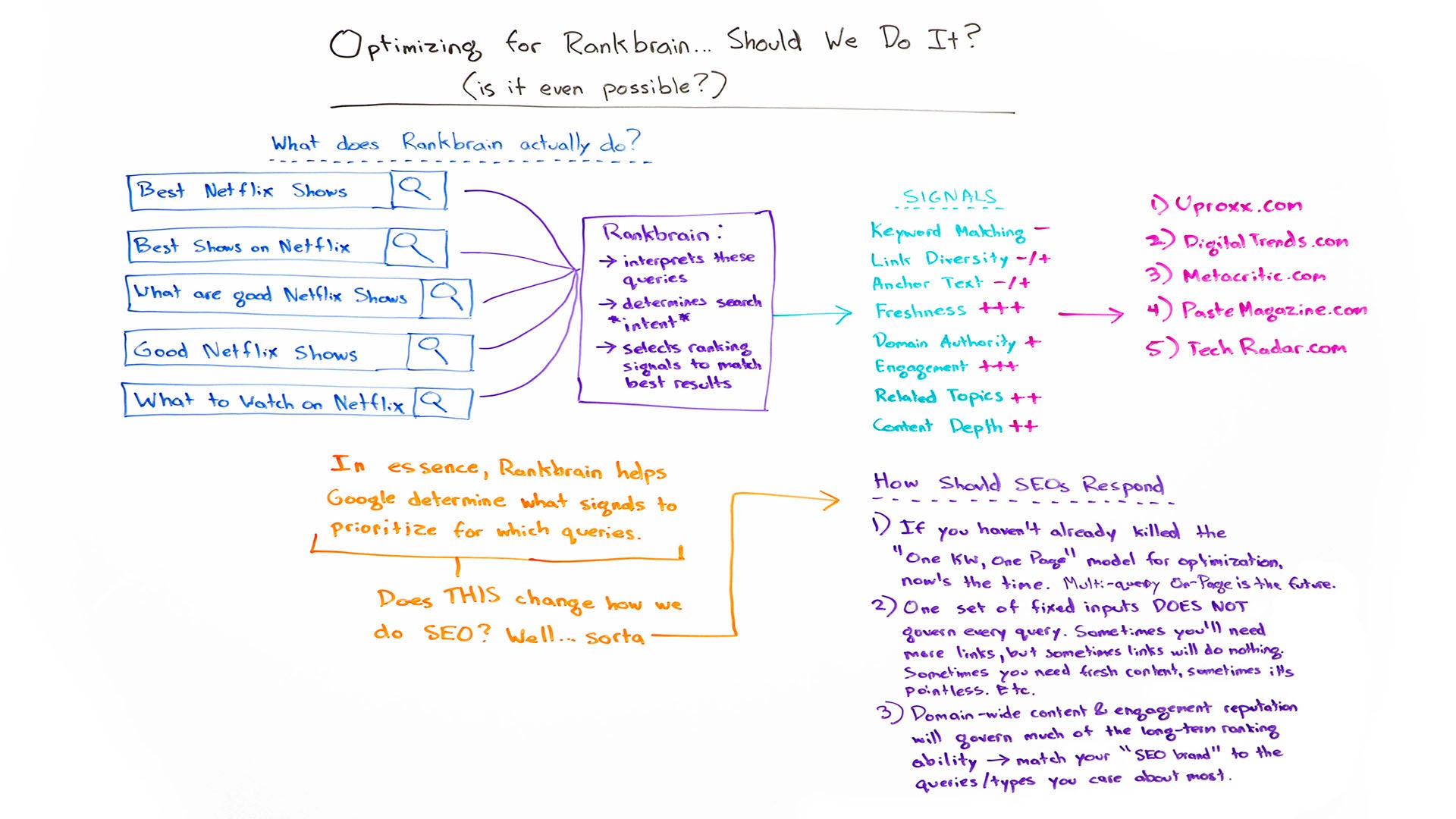Most people with a fundamental understanding of search engine optimisation (SEO) know that keywords are essential. They are the foundation of a good SEO marketing strategy, and businesses typically have a general idea of what keywords they'd like to rank for. For example, if the client runs an affordable plumbing business in Sydney, they would likely want to rank for "cheap plumbing Sydney."
Although it's easy in theory to select the keywords they'd like to rank for, businesses without experienced SEO specialists often don't really understand what goes into ranking for those terms or if they should be aiming for those keywords in the first place. That's where artificial intelligence comes in.
Artificial intelligence (AI) refers to the development of computers and computer systems capable of performing tasks that usually rely on some form of human intelligence. These systems, like the human brain, also use the data they collect to learn, allowing AI systems to refine and improve their processing via machine learning.
Artificial intelligence has changed the game for SEO keyword research (among other marketing activities). AI and keyword research are perfect for each other because the AI tool can sort hundreds of thousands of terms into a refined list of keywords that are relevant to your business. Newer tools that use AI to help sort and categorise terms expedite the keyword research process by not only finding relevant keywords, but also by categorising them by intent, volume, trend, and broader topic. With that being said, let’s take a look at some of the ways that AI helps SEO specialists and businesses with their keyword research.
AI helps define a good starting point for keyword research
SEO keyword research is exactly like any other type of research in that you have to start somewhere, and finding the right starting point for research can be tricky. Most people will start with the service or product and go from there, but considering the sheer volume of keywords available it can feel overwhelming. A lot of the AI keyword tools available help people doing keyword research by not just showing data for the terms you feed directly into the tool, but also providing matching terms, related terms, and search suggestions. Let’s break that down using our cheap Sydney plumbing business as an example.
If our starting keyword was “plumbing Sydney”, then:
- Matching terms: Contains the words you used in the original search in any order.
- Example: “cheap plumbing Sydney,” “shower plumbing Sydney”
- Related terms: These are queries that have been identified as relevant to your original search even if the terms you used aren’t present.
- Example: “emergency plumber near me”
- Search suggestions: These are autocomplete suggestions for your original keyword - aka what Google suggests when you begin to type in a search. You can actually do this directly via Google, but Google only shows you about ten or so suggestions whereas a tool shows you as many as there are available.
- Example: “best plumber Sydney” “Sydney plumbing specialists”
Although AI keyword tools aren’t all the same, many utilise this structure to help SEO specialists and businesses find new keywords and kick off their research. The search can then be repeated across different services within the business, for example, shower installation or drain installation - and suddenly you have a wealth of keywords that are relevant to your business.
Now that you’ve pulled a bunch of keywords, it’s time to cull them down. This brings us to the next way that AI helps with keyword research.
AI sorts search terms by intent
You may be thinking, if a search query is relevant to the business, why should the intent behind the keyword matter? Whenever you Google something, Google may return hundreds of result pages, so it needs a way to decide what to show the user. Google's internal AI algorithm, known as RankBrain, uses signals to determine which result to prioritise for a query, with one of the most critical signals being intent. This means Google's algorithm assesses what the user is looking to do, then matches the user to the website best suited to their query, intent, and location.
Moz has a fantastic breakdown that explains how RankBrain works, using the query "best shows on Netflix" as an example:

Ryan Fishkin, Moz
So intent is a pretty big deal when it comes to selecting the right keywords to reach your target audience. Let’s have a look at the different intents a search term can be classified as, as well as well as some examples:
- Informational: The user is looking for an answer to a specific question.
- Example: “Greek salad recipe”
- Transactional: The user is looking to complete a purchase.
- Example: “Greek cookbooks Australia”
- Commercial: The user is searching for a brand or service
- Example: “Greek language schools Melbourne”
- Navigational: The user is looking to navigate to a specific website or page.
- Example: “Stalactites restaurant Melbourne”
The first way to determine which keywords to prioritise is to assess how your website brings your audience value, then select an intent that matches that value. For example, if your website offers traditional Greek recipes from your grandmother, the intent that best fits your site is informational intent because the user would be looking for Greek recipes to cook. Because artificial intelligence can sort by intent, it gives content writers a better idea of what keywords to prioritise because it shows us what’ll ultimately provide value for the user and the business.
Artificial intelligence also helps businesses understand how users are currently engaging with their business from a keyword perspective. By understanding the types of keywords and intent that lead users to the site, we can understand the role the website plays for the user and then change the keywords if they don't align with the business's goals.
AI sorts your keywords by difficulty
Keyword difficulty refers to how hard it is for a website to achieve a top ten ranking for the specified keyword, usually represented as a percentage. If a keyword has a difficulty score of 19, we know that it won’t take that much effort to rank within the top 10 for that term. Inversely, if the keyword score is 87, it may not even be worth pursuing because the competition would be too difficult to overtake. In essence, by assessing the keyword difficulty, marketers and content writers can prioritise low-hanging fruit in the short term, and work towards building content for those higher difficulty keywords in the long term. So how can we use keyword difficulty for a more practical application?
Other than identifying generic low-hanging fruit for your business, keyword difficulty also comes in handy when doing competitive keyword research. Say you’ve conducted some research on the terms your direct competitors are ranking for, and you notice that there are keywords that currently sit below a difficulty score of 40. Your business can begin to optimise content for those keywords and start to outrank your competitors for that term.
Another way that assessing keyword difficulty can help with your marketing strategy is to leverage search engine marketing (SEM) for higher difficulty terms that are important to your business. Instead of pouring hours into creating content that would barely move the needle, you can use paid advertising to send users to your site from that very same keyword with a lot less effort. For example, if your business sells a whole range of streetwear products, but you’re trying to sell more Nike shoes for women.

You notice the keyword difficulty is really high, but the cost per click (CPC) is only 35 cents, so you could prioritise SEM advertising on this term (and similar) for the month.
Takeaway
Although Google's algorithm utilises many different signals to determine whether a site should rank for a search term, keyword research is deeply important to a site's SEO success because it influences the content creation process. The classic marketing idiom "content is king" continues to ring true, so ensuring that content is written with the desired keywords and topics in mind is an essential strategic move for any website interested in making the most out of their SEO.
AI does a lot to help out with and expedite the keyword research process, but we also understand that keyword research can still be very tedious. If you’re looking for comprehensive keyword research and an accompanying SEO strategy, we suggest hiring an AI-first digital agency (like Devotion) to help you out. Contact our team today to chat with us about what your SEO needs are, and we can help you craft a tailored SEO strategy complete with AI-supported keyword research.


